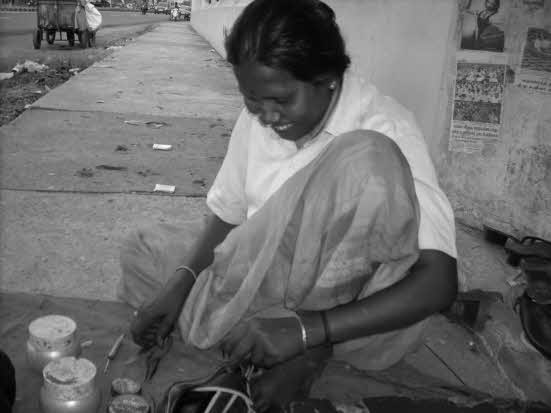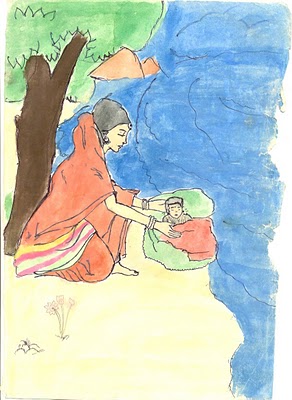by Shraddha Vinod Kutty
[box]A tough life in a city not her own. A life where she doesn’t know how much money she will have by the end of the day. And yet, a ready smile on the face. Shraddha Vinod Kutty talks about a migrant lady cobbler she met in 2010, and her perseverance and fighting spirit despite staring down the face of poverty.[/box]
Patriarchy may never be murdered in cold blood and poverty may never be served the death sentence. Though always stuck in this impasse, the human spirit shall never abscond.
Meet Muniammal (45) – the lady cobbler of Elamkulam, a minuscule ward in Ernakulam district, Kerala. Her black hair tightly spun into a bun, a dirty yellow shirt smartly buttoned up over a fading sari, she sits on the footpath near the bus stand, deftly mending shoes, bags and umbrellas. A set of stiff pliers, a roll of strong black thread, a blunt needle, a bottle of wax and a smile; these form Muniammal’s bailiwick. Hammering recalcitrant leather on the metal last and mending thick gents shoes are inevitably her husband Nagarajan’s job. She calls him ‘her protector and guru’. Ivar than en kaduvul, en guru, she says pointing at him. He smiles shyly and continues his work. Around one o’clock he stretches and proceeds to the main road seeking some food and a quick puff of tobacco. She continues working for her last customer –yours truly.
Muniammal’s story can be built around one small plastic cover. A plastic cover she keeps close by always. To peek through the contents of this cover one only need ask her a simple question: Do you have children? She stops work, wipes her calloused hands on her sari and reaches for the cover. Photos of her children, for whom she came to the shores of Cochin with Nagarajan, are proudly displayed. The fact that they have now ostracized her from their lives only makes her eyes glisten with unshed tears; the smile and pride are intact. She is happy that they are safe and settled in Madurai, her home town. She is satisfied that over two decades of toil have not come undone. It will not matter to her that three years back the government passed the ‘Maintenance and Welfare of Parents and Senior Citizens Act.’ It will not matter to her that she has been denied what is due to her. It will not matter because, as Dostoevsky mused, ‘Man grows used to everything…’ Muniammal has grown used to the toil, the shunting and the stench of leather. After a point, you just stop fighting.
But you never stop dreaming, weaving the story of a better tomorrow. Muniammal’s hopes lie in two tattered pieces of paper (also enclosed in the cover) – photocopies of their election identity cards. And her hopes, she believes, will be realised by an aging politician who looks at the world through dark glasses. His photo is bound securely to the identity cards. She bows before it and says, Ivar than en thalaivar (He alone is my leader). She can’t wait for the elections to rush to Madurai and cast her vote; where else would you get a kilo of rice for one rupee?
It is a different thing that she may never save up enough for that journey. A loan taken to buy the implements they use; a monthly rent of Rs.900 for a shanty in the city; a bare minimum income of Rs.50-100 a day (or maybe Rs150 on a rainy day) divided between two people. The arithmetic of her life will never make sense. But she still smiles as she talks to me – a mischievous smile, in fond reminiscence of times far gone: when she bunked school to play with her friends. She will also smile a smile that gently muffles the sorrow of not passing her first standard exams. And in jest she will say, ‘Even in that he (Nagarajan) is two classes ahead of me – he’s third fail!’
She ties a firm knot after the last stitch, tests the tenacity of her handiwork and gently places the sandal near my feet. I slip it on and ask her, ‘How much?’ She says, ‘Thirty’. I have a crisp hundred and a twenty eight. I couldn’t give the hundred –they hadn’t any change, as a client before me had just been informed –or the twenty eight. My eyes fall on a neat stack of shoes. I ask whether any of those shoes are for sale. No, they weren’t. People who rushed by in cars left them for repairs and never came back. The newest one has been there for six months now. Why did they work so hard on these shoes? Why do they guard them like their own? I have no answers to these questions, so I scramble for change. She asks me to give whatever I have. I give her the twenty-eight and she is visibly glad that her customer is left in debt.
As I bid goodbye, I realise that she is infact a revolutionary of sorts: An adept cobbler, a working woman, a mother, a true partner to her husband, and a migrant with a fighting spirit. Poverty may have ravaged her soul but she won’t stop working. Most importantly, she won’t forget to intersperse her tears with a sparkling smile.
But as I walk away, a small voice also tells me – humankind may grow used to everything, but not the embarrassment of inequality.
Shraddha Vinod Kutty is ‘studying’ Development (or underdevelopment, depending on your perspective), through the lens provided by the city of contradictions, Mumbai. Coming from a small town in Kerala, she loves her mother’s sambhar-choru-pappadam. When not enjoying her sound sleep, you will find her listening to jazz, reading or writing. One who prefers to be left alone, her abiding fantasy is to be able to meet Rodya Romanovich Raskolnikov.
[box type=”download”] If you have trouble opening the PDF, please right click on the button and select ‘Save Link As/Save Target As’. This will help save the PDF to your computer. If you still have trouble, drop us a mail at editors@sparkthemagazine.com and we will mail you the PDF straight to your inbox! DON’T MISS THE PDF EXPERIENCE![/box] [button link=”http://www.sparkthemagazine.com/wp-content/uploads/2012/03/spark-march-2012.pdf” color=”orange” newwindow=”yes”] Click here to download the March 2012 issue as a PDF![/button] [button link=”http://issuu.com/sparkeditor/docs/spark-march-2012?mode=embed&layout=http%3A%2F%2Fskin.issuu.com%2Fv%2Fcolor%2Flayout.xml&backgroundColor=000000&showFlipBtn=true” color=”green” newwindow=”yes”] Click here to flip and read the issue like a magazine[/button]
[facebook]Share[/facebook] [retweet]Tweet[/retweet]









